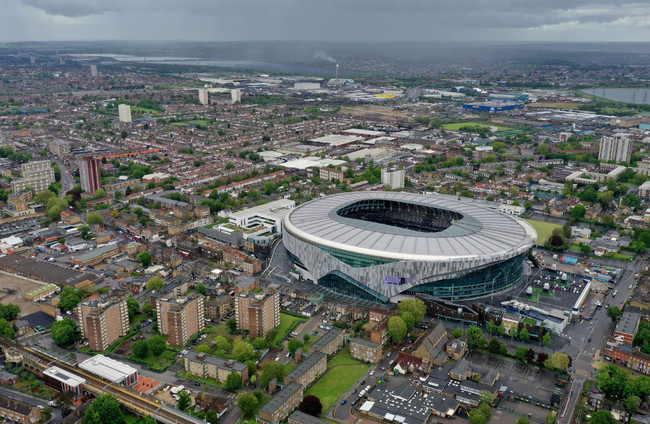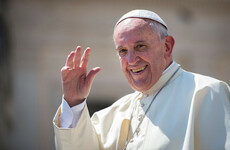LAST UPDATE | 13 Jan 2023
IT MIGHT be tempting to suggest this weekend’s North London Derby is the biggest and most important one that has taken place in a long time.
But that is not strictly true when you remember last season’s equivalent fixture was almost as close to a Champions League qualifier as a Premier League fixture can get, as it was the third-last game of the season for both sides.
On that occasion, it feels like the roles were reversed compared to now.
Arsenal were showing signs of wilting, having lost four of their previous nine fixtures, whereas Tottenham had been rejuvenated under Antonio Conte.
Spurs would beat Arsenal 3-0 and lose just one of their last 11 top-flight games on their way to securing Champions League football.
Much to their fans’ dismay, Arsenal simultaneously missed out on qualifying for Europe’s biggest club competition.
Therefore, just eight months ago, it looked like Tottenham obviously were the North London team on the up — if you were to ask which of the two clubs would be title contenders for the 2022-23 season, neutral observers would predominantly say Spurs.
Yet as Sunday’s clash approaches, it is Mikel Arteta who is being hailed for transforming the Gunners into a side that look capable of winning the Premier League title, whereas there are continual question marks over Antonio Conte’s future at Tottenham.
But despite the 11-point gap between the teams, football is seldom straightforward, as illustrated by the sides’ contrasting fortunes at the end of last season.
It is earlier in the campaign than it feels for mid-January — now is only roughly the halfway point, as many teams this weekend will be playing their 19th out of 38 games.
Arsenal’s most recent Premier League fixture — a 0-0 draw at home to Newcastle — was just the third time they have dropped top-flight points this season (away at Southampton and Man United were the others).
But the big question most people are asking is whether Arteta’s squad has the depth and experience to cope with the rigours of a title race, particularly in a unique season significantly disrupted by the Qatar World Cup.
They have already lost one key player to injury — Brazilian forward Gabriel Jesus — for a substantial period.
Yet there are some factors working in their favour. They are already out of the EFL Cup, affording them potentially pivotal rest time, having been beaten in their first match against Brighton.
They may well soon be out of the FA Cup too, having drawn Man City in the fourth round.
The Europa League knockout stages await, but Arteta likely will be tempted to continue with a largely second-string side in that competition.
And do they have less impressive squad depth and experience compared with, say, Leicester’s 2015-16 champions?
As was the case then, most of the sides tipped to potentially challenge for the title have been unconvincing at best.
Chelsea and Liverpool are so far off the pace that a top-four finish would feel like a decent achievement at this stage.
Man United and Tottenham have been sporadically impressive but are both in transition to a degree and don’t feel fully formed yet.
Even Man City, most people’s pre-season favourites, have dropped points five times already, including twice in their last four matches.
Consequently, a surprise top-two of Arsenal and newly mega-rich Newcastle is not beyond the realms of possibility.
The point is often made that Arsenal’s relative success at the moment exacerbates Spurs’ present shortcomings.
Indeed, taking a step back, the position Conte’s men find themselves in is far from disastrous — they are still in the Champions League and FA Cup, and just two points off Newcastle in third.
But while Spurs and others are no doubt envious of Arsenal’s present position, perhaps it is Eddie Howe’s men’s rise that feels most galling.
At the equivalent point in the season last year, the Magpies were 19th and looked in serious danger of relegation.
Their dramatic improvement since then has shown how simple success in football can be if there is enough money at a team’s disposal.
Buying several new players and putting them on big wages as well as hiring an accomplished manager really can turn a club from relegation candidates to top-four contenders within the space of 12 months.
Many pundits previously argued that it would take time — ‘five years’ was routinely cited — for Newcastle to become capable of competing with the best teams in the league, but that is not necessarily true, as their success has proven.
And if it wasn’t already the case before, fans and critics have certainly woken up to what is possible and how closely interlinked success and finances are in the Premier League, provided the money is spent with a degree of competence and footballing knowledge.
So in the 1990s, if a team was struggling, supporters might call for a change in manager, a few new signings or lament the fact that a certain player either is/isn’t being picked. Owners were seldom under the same level of scrutiny.
Now, increasingly, it feels as if the ‘Newcastle effect’ is having wider ramifications.
It is the owners, rather than the managers or players, who increasingly bear the brunt of supporters’ frustrations.
A portion of Chelsea fans recently sang the name of the previous owner Roman Abramovich when the current team was struggling. There have been similarly loud recent calls at Tottenham for Daniel Levy and his colleagues to step aside.
Man United fans, of course, are ahead of the curve in a sense as they have been protesting the Glazers’ ownership for years now.
Even at Liverpool, a team who have overachieved to an extent in recent seasons compared to what they can afford to spend, there are murmurs of discontent and strong signs Fenway Sports Group will soon sell the club.
At times, it seems that near-relentless success — the kind Man City have experienced of late or that Newcastle may soon become accustomed to — is the only solution to stemming widespread fan disaffection.
So really, it could be argued that Newcastle’s success rather than Arsenal’s is the biggest reason behind Spurs fans’ palpable unhappiness — the team were booed off following a particularly dispiriting New Year’s Day home defeat by Aston Villa.
Like Tottenham and their so-called ‘Spursy’ tendencies,’ for years, the Magpies were seen as somewhat of a joke by rival fans owing to decades of persistent failure and on occasion, dramatic underachievement.
The North London club — who last secured the title in 1961 and whose major trophy wins since the turn of the century amount to a single League Cup triumph (in 2008) — look at the substantial upturn in fortunes for present-day Newcastle and think ‘that should be us’.
And they may well get their wish. It seems now that every underperforming club secretly yearns to be funded by a state with a morally dubious human rights record a la Newcastle, PSG and City.
And recent reports suggest Qatar’s sporting investment group has held talks with Tottenham amid plans for a possible investment.
According to The Guardian this week: ”Sources close to Nasser al-Khelaifi, the chairman of Qatar Sports Investments (QSI) and president of Paris Saint-Germain, have confirmed that he met Daniel Levy, the chairman of Tottenham, in London last week.”
Putting aside the moral quandaries and the many well-documented human rights issues that were discussed at length around the time of the 2022 World Cup, a potential deal would be complicated by the fact that European clubs are forbidden from taking part in the same competition if they share an owner.
However, minority stakes are permitted (QSI also own 22% of Portuguese club Braga) and so this possible solution could be one way around the problem.
And with Spurs heavily in debt owing to the construction of their new stadium and revenue lost during the pandemic, Levy may be tempted at the very least to seek support from elsewhere.
And like Spurs fans, QSI will have watched Newcastle’s recent rise with a mixture of awe and envy.
Regardless of Saudi Arabia’s even worse human rights record than Qatar, with a few notable exceptions, their ownership of Newcastle has gone relatively unchallenged by fans, authority figures and a significant portion of the media.
It would of course be naive to expect that the Spurs situation would be significantly different if it transpires.
And a bad result on Sunday will only intensify calls for these changes to come to fruition.
Upcoming Premier League fixtures (3pm kick-offs unless stated otherwise):
Friday
Aston Villa v Leeds (20.00)
Saturday
Man United v Man City (12.30)
Brighton v Liverpool
Everton v Southampton
Nottingham Forest v Leicester City
Wolves v West Ham
Brentford v Bournemouth (17.30)
Sunday
Chelsea v Crystal Palace (14.00)
Newcastle v Fulham (14.00)
Tottenham v Arsenal (16.30)













Cmon Shane .
Sky sports
Can we please know what par the hole is before he hits his first shot.
Come on Dustin Johnson and do it for the golf purists.
Lowry bandwagon will be back again soon. In the meantime break out the Union Jack and follow McIlroy in the Olympics.
But the trolling bandwagon will roll on, in its self-pitying lonely journey through the dirty slums of its pathetic existence crying out for the attention it never got from Mommy.
And so it came to pass that John realised he had no friends and that trying to be controversial did not make him cool
I dont follow golf……but I know its serious when the42 has a live blog of a golf event.Hope he comes home as a champion!
Same here Irin..it would be a ‘Yuge’ achievement.
Live blog is the best way to watch golf
Cmon Shane. We need a win this weekend!!
He’s not representing his country, Not the same.
Most reds ever.
I bet there was some amount of candles lit in Clara Church at this mornings mass.
Even more rosery beads sold in the market this morning
Come on lowry kiiiiiiidddd!!
This is an absolute outrage from the USGA!! I’m all for Lowry to win, but I certainly wouldn’t begrudge Johnson a first major either but he’s being treated very unfairly here in my eyes.
Yeah, lousy by the USGA, they should do the right thing and disqualify him! Come on Shane!!
I think it’s unfair on all the players considering they have all allegedly been told what’s happening. It’s farcical at the moment though. Really stupid decision making by the USGA.
Unbelievable!
Monday lotto?!
Unbelievable!
John Hayes I really hope you get to eat humble pie
Don’t worry-you can get off the bandwagon at the next stop with all the rest.
John, you are a pathetic human being but I presume you post these comments because you derive pleasure from people thinking of you as pathetic. Congrats chief
Pity 3 x3 putts in a row Shane doesn’t deserve to win it now,had a four shot lead and couldn’t hold it,not good enough this week to win a major,maybe another time.
Its getting painful to watch now. Hope he can finish outright 2nd
What an athlete!!!!
Shane finishing off a typical weekend for Irish sports by choking when it matters
Im going to bed cant take anymore dreams dashed,
Hold on….Hang on a mo
This ain’t over yet by a long shot…………
Needs to take the initiative here Shane.
Waiting for the pack to slip up is not a good tactic.
Seize the day.
So is DJ on -5 or -4? They should make a ruling now, nobody knows what score the leader is on, it’s crazy!!
Not looking good now with that bogey on 10
and will paddy power pay out if he does?
Poor front 9 for Shane not helped by his partner who is having a mare,hopefully he can regroup.
Johnson’s partner Westwood had as big a mare.
Lowry all too often struggles on the last day, he’s just too out of shape and is at a clear disadvantage because of it.
Achieved far more than you ever will. And has a hell of a lot more friends I’m sure.
You can see the pressure on Shane’s face in those last couple of shots!
Poor show at the 14th there.
This is stupid make a decision already! Can’t see a penalty but man up.
Settle
G’wan Shaneo
Delighted for Dustin Johnson…. After all he’s been through over the years, I don’t think there’s a soul on earth who would deny him a major!
Bar Jason Dufner of course after Johnson ride his wife
Top European,joint second, toughest course you could play be proud you have to lose one to win won .
Johnson playing at a snails pace
FFS Shane. ……what are you doing man
Bottle job.
Bottle job is a kind way of putting it.
the irish rugby team bottled it against South Africa and now shane Lowry is doing the same.
He’s thrown in the towel all right.
No courage.
Ireland did not ‘bottle’ it. They were beaten by a much better and stronger bench and at a venue where only two teams have ever been South Africa. Nowhere do Ireland play rugby at nearly 6000ft on a regular basis. 7 of the South Africans play there every week.
Shane did not choke today. He missed a few long puts which left awkward 6/7/8 footers for par.
I think we need to get beyond this ‘choke’ and ‘bottle’ mentality here. It’s self-perpetuating.
Can’t find the Shane Lowry jersey anywhere online.
Back from weekend away,planned to celebrate Ireland test win over SA,didn’t happen,hoping for a draw against Belguim ,didnt happen,come on Shane !!!!pleeease
Unfortunately Shane Bottled it..
He’s still in it. My bet a tie with a play off.
Kinda ridiculous that they still haven’t made a ruling on the penalty stroke for Johnson.
Shane Lowry and others have been informed that he is facing a possible penalty so that’s bound to colour their psychology on the run in.
Best thing Shane can do now is ignore that ‘Rumour’ and play the tournament according to the official leaderboard.
Ireland vs. Belgium in football, vs. South Africa in rugby, and vs. the ROTW in one of the majors in golf, what a horribly disappointing weekend of sport for us, especially the latter two where we blew what should have been unassailable leads.
Short of getting in the car Nd driving to Clara where can I watch it without sky sports!?
Download Mobdro off internet onto your android phone or tablet and watch away
Bandwagon running rough?
Keep it going Shane